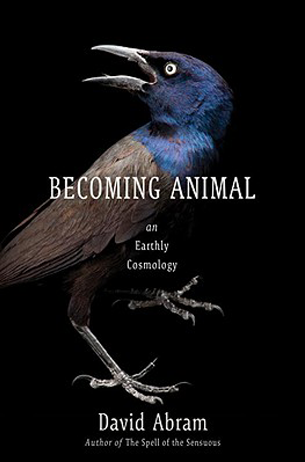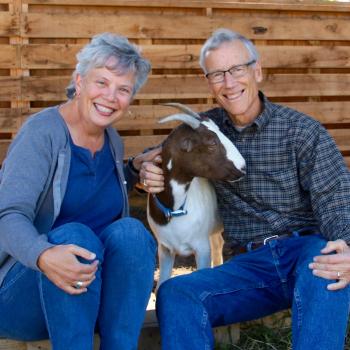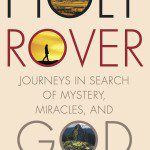Today’s post is by guest blogger Bob Sessions, a continuation of his Barriers to Spiritual Growth:
If you’re like me, you’ve struggled to make sense of the many far-out claims of religion. So often it seems we’re asked to leave our intelligence, experience, and scientific learning at the door when we enter the holy realm. At the very least we’re asked to embrace an extraordinary vocabulary and set of beliefs that seem to fly in the face of most of what we ordinarily know and believe.
For example, in the Abrahamic faiths, the metaphors we use when speaking of the holy are almost always transcendent in one way or another: beyond the veil, in heaven, crossing over, sacred not profane, leaving the flesh behind, and so on. I find that the usual ways we are taught to make sense of these doctrines don’t mesh with the world I know.
 I’ve come to believe that perhaps the problem isn’t that religious experience and dogma are about a totally different world, but that we’ve been given the wrong tools for making sense of them. What if in our quest for the sacred we are looking in the wrong ways for the wrong thing in the wrong places? What if striving to transcend our animal nature, our embodiment, harms the very basis of spiritual life?
I’ve come to believe that perhaps the problem isn’t that religious experience and dogma are about a totally different world, but that we’ve been given the wrong tools for making sense of them. What if in our quest for the sacred we are looking in the wrong ways for the wrong thing in the wrong places? What if striving to transcend our animal nature, our embodiment, harms the very basis of spiritual life?
Richard Rohr suggests as much in his Franciscan focus on the everyday sacred. While not explicitly spiritual or religious, philosopher David Abram’s recent book Becoming Animal: An Earthly Cosmology explores in profound and lyrical detail what it would be like to become more rather than less animal. In the process he bends his readers’ imaginations in surprising and potentially life-changing ways. I’ve found this nuanced and richly textured book to be very helpful in healing the mind/body split that plagues western culture.
Becoming Animal is a work of “applied phenomenology.” Phenomenology begins with phenomena, with our experience of what is, and tries to understand a reality in all its complexity instead of passing judgment on the ultimate nature of reality (the domain of traditional metaphysics) or the kinds and limits of knowledge (epistemology) or the abstract nature of goodness or beauty.
Through vivid descriptions of personal experiences with animals, as well as reviewing some of the findings of animal scientists, Abram coaxes us to re-examine our deep-seated belief that we are alone in our ability to understand and communicate thoughts and feelings because we have words. He believes this bias lies behind not only our lording over nature but also our alienation from our bodies.
I love Abram’s examples of his communication with animals and plants. He recounts being in situations of potential danger when he is among a large herd of sea lions or when he comes face-to-face with a cow moose and her calf. He defused these situations by talking, singing or signaling to the animals who he is and that he means no harm. Part of what is fascinating about his remarkable examples is that Abram found himself behaving in ways that established harmony with the other creatures without thinking–his body knew the right kinds of gestures to communicate his peaceful intentions. He was shocked out of his self-consciousness (“I’m going to die!”) into his animal nature.
Abram writes that other creatures have highly developed capacities to communicate and that they share with us an understanding of friend or foe, another animal’s intentions, and whether a creature is to be trusted. Language allows humans to engage in more complex communication, perhaps, but as anyone knows who has had a pet, communicating with our non-human companions is pretty easy if we pay attention.
One way to put Abram’s point is that mind/body dualism is a self-reinforcing belief: if we believe we are minds and our bodies are “weak vessels,” we tend to live more in our minds and ignore what our bodies are telling us. The way out of this rut that has so many harmful results is to become more animal.
The communication abilities of other creatures weave them into the fabric of their surroundings rather than separate them from it. Why should it be different for us? The more we use our remarkable abilities to understand the world, the more we realize our embeddedness not only in our local places, but in the atmosphere, the grand cycles of nature, the intricate interplays of the forces of physics, and so on. The phenomenologist wants us to realize the dynamic connections we have with other beings (including humans) precisely because we are bodies. Our bodies connect us directly with the world rather than alienating us from it.

If you want to see what this looks like, I highly recommend My Life as a Turkey, a 2011 PBS documentary about Joe Hutto’s year as a turkey mom. Literally. Hutto hatched 16 wild turkey eggs and imprinted with each hatchling as they emerged by clucking to them and holding them. Early on he is with them 24/7, taking them afield to forage, napping and then roosting with them at the end of the day.
For nine months, until they literally fly the coop, he is their protector and comforter, but in many ways they are more his teacher than he is theirs. Hutto learns how much intelligence is hard-wired in his brood—-they easily distinguish between a wide array of snakes and have vocal variations signifying which one they spot, for example. Hutto sees how they use subtle vocal differences to communicate changes in moods, weather, available food, and well-being, and how they interact easily and differently with a wide variety of other species. And he is startled when he realizes that because of his role as mother hen to the turkeys, animals like bears, deer, squirrels and birds do not shy from him as they would if he was not with his brood.
Hutto’s ruminations about his experiences mirror Abram’s more philosophical discussion. Being fully embodied in the moment heightens his awareness of his interconnectedness with other beings and how being embodied is primary.
Here is where all this talk about becoming animal hits the theological road. God may be incomprehensible but that doesn’t mean we have to put him in a separate, transcendent realm. It’s not about transcendence. The main message of the Bible (and of the Koran) is that God is here with us now. If there is separateness or alienation it is because we are ignoring the relationship, for as Abram and Hutto suggest, it is through relationships, even with turkeys, that we jettison our narrow ego concerns and experience unity consciousness. The stuff of spiritual experience.
Watch My Life as a Turkey, and read Becoming Animal: An Earthly Cosmology. Or maybe adopt a bird. You might find it to be a wise teacher.











